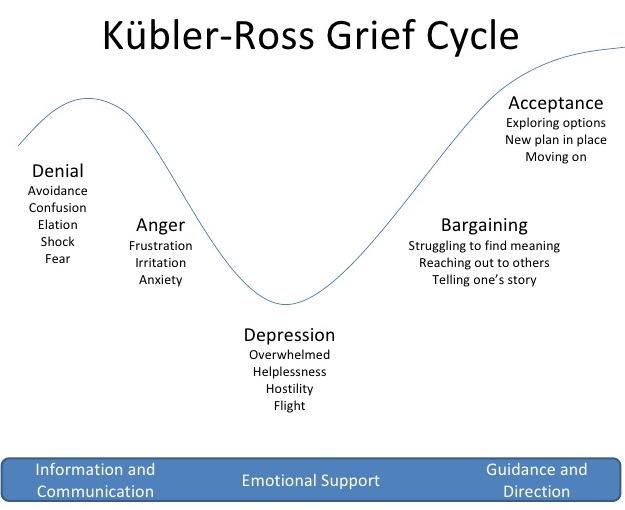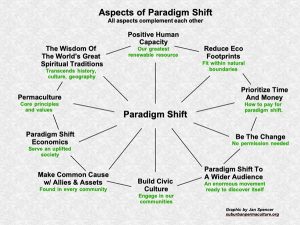As half of America chooses fascism, the final stage of grief is: radical acceptance
9 min read
by Mark Robinowitz
My name is Mark Robinowitz. I’ve been politically active for four decades, mostly outside traditional constrained political parties. PeakChoice.org is my main website, and the homepage has an extended version of last month’s conversation at Whole Community News.
[00:00:21] Limits to growth is not on the ballot, a reason I’m politically homeless, not affiliated with a party, independent. I’m a former Green who is voting for Kamala Harris and Tim Walz. Those who are horrified by the potential that a racist, sexist, pathological narcissist who is vowing to lock up his opponents might win, find it difficult to comprehend that almost half of the voters support these dangerous threats.
[00:00:54] My guess (for what it’s worth) is Harris and Walz will get the job, but it’s not a guarantee. The Democrats are doing all the right things, creating unprecedented coalitions to increase constituencies, but it might not be enough. There’s going to be legal warfare from the Republicans, and even if unsuccessful, MAGA is not going away.
[00:01:21] We may see House of Representatives suppressing the outcome, and of course, the Republican Supreme Court may bring results different than the will of the people. Rationally speaking, the Democrats are on the path to win. But we’re not really a rational society and the Trump era clearly shows this.
[00:01:41] It would be nice if Trump’s temperament was polling at only a few percent. But his level of support reflects severe difficulties with a huge swath of society, plus strategic mistakes by the Democrats.
[00:01:56] It is tempting to say our educational systems need improvements, and this is true, but a deeper understanding is we are experiencing severe mental health crises in our society, which the election campaign reflects. How to cope with this in the final days of the campaign—the struggles ahead, counting the results, potential coups when the Electoral College meets—these are concerns that strain our sanity.
[00:02:27] The domestic fascist danger may be greater in the USA now than in any previous time in our history. There have been blatantly fascist movements: the Ku Klux Klan, American Nazis just before World War II, including their now-notorious rally in New York City’s Madison Square Garden just before the war broke out, efforts to thwart the civil rights movement, the rise of religious fundamentalism allied with the Republican Party under Reagan, to cite a few examples.
[00:03:01] The Oct. 27 spectacle of the Trump campaign in New York City was a particularly disgraceful and scary event. It was partly a long-term desire of Donald to stage a show in downtown Manhattan to prove his centrality to society. It may have also been the October surprise of the 2024 campaign, a self-inflicted wound that may tip the outcome away from him, due to widespread revulsion. It’s gotten substantial scrutiny from stupid and degrading, not funny, racist jokes that may boomerang, encouraging Puerto Rican voters in swing states to help ensure that Donald is defeated. But even that happy result would still not end the substantial support of millions for intensely racist, violent threats against minorities and political opponents, anyone and everyone who does not conform to what the Republican MAGA party wants as their vision.
[00:04:07] This rally also shows how fascist movements eventually become unstable and fall apart. Hitler’s plan for a thousand-year Reich lasted only a dozen years and destroyed Germany and many other countries before it was defeated. As Gandhi said, ‘There have always been tyrants who have seemed invincible, but in the end they always fall.’
[00:04:32] It is difficult to cope with the potential that a fundamentalist fascist vitriolic campaign is on the cusp of potentially winning reelection. It is not political hyperbole to point out the many threats this poses to everyone, but especially to minority groups, political opponents, international peace, and ecological integrity. It feels like we are innocents on Death Row, waiting to hear if one’s judicial appeals will be successful. Even if our legal team wins our freedom were at least a day of execution. The anticipation is still stressful. An exoneration does not undo that, just like Donald losing won’t erase the stress of anticipating MAGA 2.0.
[00:05:23] As the election gets close, too close for comfort, there has been an increase in media stories about how many are feeling anxious, sometimes accompanied by modest suggestions to reduce the stress. Meditation, doing pleasant things with family and friends, other things to distract the mind.
[00:05:46] Some advocate for activism to feel like they’re helping practically, volunteering with phone banking, we’re helping people get to the polls in states where that applies. I don’t wish to discourage that type of outreach, but it is not realistic that they can give a volunteer much ability to alter the outcome. Holding a mental space for uncertainty is a key part of the experience we are all going through as uncomfortable as it is.
[00:06:17] Elizabeth Kübler-Ross famously described five stages toward acceptance of death: denial, anger, bargaining, depression, and acceptance. This framework, admittedly simplistic, can be useful as a guide toward societal level of avoidance of severely unpleasant situations, such as a potential fascist takeover.
[00:06:44] Denial and bargaining are in many ways similar enough to put in their own category: ‘Another Trump term won’t be so bad. We survived the Trump/Pence administration and therefore a repeat could be endurable.’ There are two flaws with this argument. First, over a million Americans did not survive Trump’s bungling of the COVID pandemic and Republican downplaying of the catastrophe. More Americans died from COVID than from all wars since 1776 combined. Trump privately knew it was very dangerous, but in public downplayed the risks, telling his followers to trust various quack treatments, which increased the death toll.
[00:07:34] Even worse, Trump 2.0 risks a more severe situation since the so-called ‘guardrails’ of more moderate members of the cabinet will not be present. The Trump officials have learned from their mistakes the first time and are ready to implement Project 2025 on Day One. In 2016, the Trump people did not anticipate that they would get the job. They are not making the same mistake this time.
[00:08:07] I’m no fan of those who served with him, but many have come to their senses belatedly and are warning the citizenry not to risk his reelection.
[00:08:18] This warning is unprecedented in American history.
[00:08:23] And on the other side, Trumpers also feel anxious that a supposedly far-left comrade Kamala Harris might win the presidency, although their discomfort is less grounded in reality. But despite that, their feelings are real for them and if Trump does not get the job, they will feel disenfranchised and in many cases full of anger and potentially anger leading to violence. So this is a conundrum that has to be gently dismantled and that’s going to be a large-scale societal challenge.
[00:09:06] After the Nazis lost their war, there was denazification in Germany, and we need a de-escalation in our society. One of the Democrats, who’s run against of the worst Republicans in Congress, calls what we’re dealing with angertainment, and Donald’s show has been focused on the angertainment for his followers.
[00:09:35] Stochastic terrorism is also a huge aspect of this, where Donald or other leaders whip up their followers into a frenzy. One of them threatens or commits a violent act, and then the leaders have plausible deniability that they didn’t actually order anybody to do this. They had nothing to do with the horrible act, which of course they denounce. But it’s an old tactic, dating to medieval days, of washing one’s hand from this sort of violence. As a British king said: ‘Who will free me from this turbulent priest?’
[00:10:22] The Department of Homeland Security warns that far-right violence and this form of domestic terrorism is at the highest danger to the security of our society. Realizing these problems, a lot of people think into a numbing depression fading out from thinking about these problems. It’s probably the most common approach that most of America has used for much longer than the Trump era.
[00:10:54] But retreating from facing reality does not make reality go away, whether you’re talking about far-right politics or the climate crisis or limits to growth or any of the other large scale challenges to civilization.
[00:11:12] It takes courage to look unflinchingly at what we have done to screw things up.
[00:11:19] But there’s a cost to pay internally for that vision. More social solidarity is essential to make it easier for people to have such clarity, which leads me to radical acceptance, which does not necessarily mean one supports a situation. Being able to look clearly at something unpleasant and recognize its reality is not the same thing as agreeing that the situation is desirable.
[00:11:56] But it’s an antidote to the fantasy cultures that we have, the parallel universe of alternative facts, the countless distractions of our culture, and taking substances and entertainment that makes up weird fictions that are not helpful for addressing where we are all at. This is part of what energizes the subcultures or cults that sometimes have small bits of truth mixed with nonsense. QAnon and other variations are great and horrible examples.
[00:12:36] And threats against democracy are not new. During the Reagan administration, we had the Iran-Contra conspiracy where Oliver North, working in the White House, planned on rounding up huge numbers of immigrants and domestic dissidents. There was a meek investigation by Congress into this scandal, and when Congressman Jack Brooks started asking Col. North about some of the senior aspects of this, he was told by the chair of the committee, another Democrat, that in no way are we going to look into the details. That was Sen. (Dan) Inouye from Hawaii who warned him to shut up.
[00:13:25] We had the war in Vietnam, which was totally avoidable. In Eugene, we are home to Sen. Wayne Morse, who was told in 1963 by President Kennedy we were about to withdraw from Vietnam because he realized it would be a disaster to escalate. Well, two weeks later Kennedy was removed from office and the policy of withdrawal was reversed. And I have yet to find Democratic Party partisans who are comfortable acknowledging this inconvenient history, which led to a lot of the decline of democratic institutions and bitterness and division that we’re still grappling with today.
[00:14:16] We had, for decades, America sponsoring coups all over the world, sometimes against democratically elected governments. And there’s been minimal investigation of these. Some of them led to large scale slaughters of millions of people. and they are far better understood in the rest of the world than here in the home of the brave.
[00:14:43] Donald is a bigger threat than even Ronald Reagan to our democracy, but it is the previous abuses that helped pave the way for the current crisis. I deeply respect the Never-Trump Republicans who have stood up to their party, but I wish they could see that the Republican Party’s retreat from democratic principles did not start in 2015 when Donald decided to run for president.
[00:15:18] Earlier this month, Kamala Harris went on Fox TV and did a remarkably good interview. But at one point, the interviewer tried to bait her saying if you believe that Donald is a fascist and a racist, then you must think that half the country believes these things. And she said, ‘No, I would never say that about the American people.’ And that was my least favorite part of the interview.
[00:15:51] My view is more from the late comedian George Carlin, where he said, ‘Everybody complains about politicians. Everybody says they suck. Well, Where do people think these politicians come from? They don’t fall out of the sky. They don’t pass through a membrane from another reality. They come from American parents and American families, American homes, American schools, American churches, American businesses, and American universities. And they are elected by American citizens. This is what we have to offer. It’s what our system produces. If you have selfish ignorant citizens, you’re going to get selfish ignorant leaders.’ And he concludes that the public sucks. And there’s a lot of truth in that. But we also have the ability to shift if we want.
[00:16:45] The poet and musician, Utah Phillips, said those of you who are inclined to worry have the widest selection in history. We are at a time when things are getting better in some ways while getting worse in others.
[00:17:02] Martin Luther King cautioned we have guided missiles and misguided men, and this has grown worse since he said that more than six decades ago. Now we have climate chaos, resource depletion, overpopulation, overconsumption, ecological overshoot, war, economic injustice, increasing polarization all over the world, and many other aspects of the polycrisis, threatening to crash civilization and Spaceship Earth itself. These induce a level of anxiety that the mental health profession has barely begun to address.
[00:17:41] So at PeakChoice.org I am posting a number of references and links to understand religious fundamentalism, the psychopathy of MAGA, some humorous diversions that skewer with impunity, cult dynamics, and some of the history that led us to this state of that we are in.
Image U3173699, CC BY-SA 4.0, via Wikimedia Commons.




